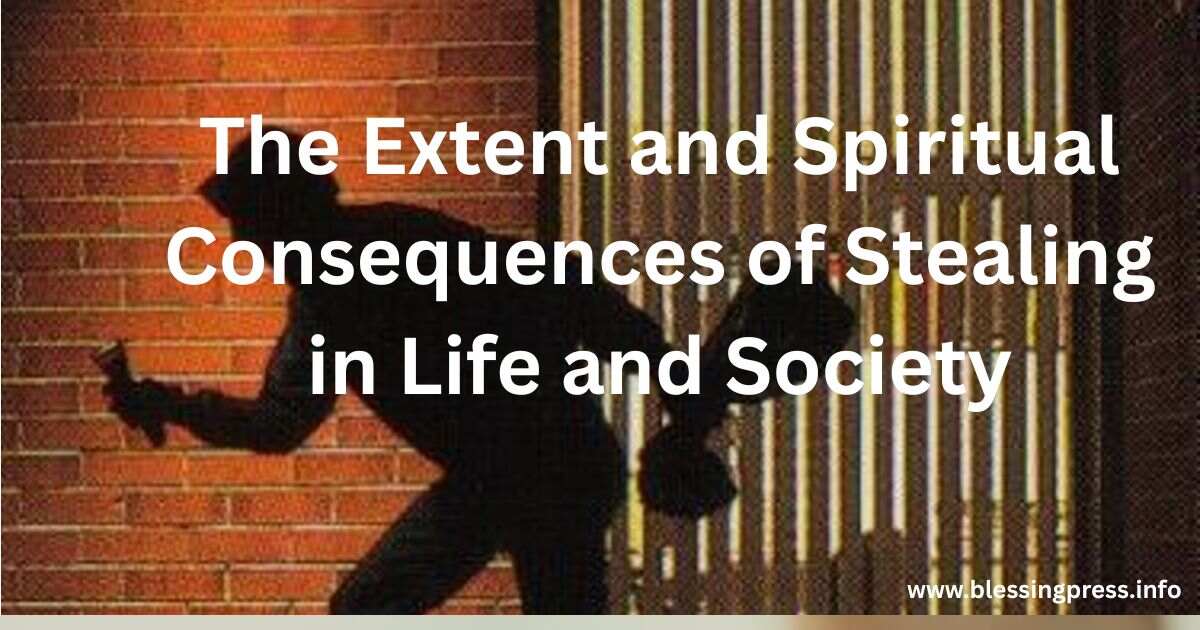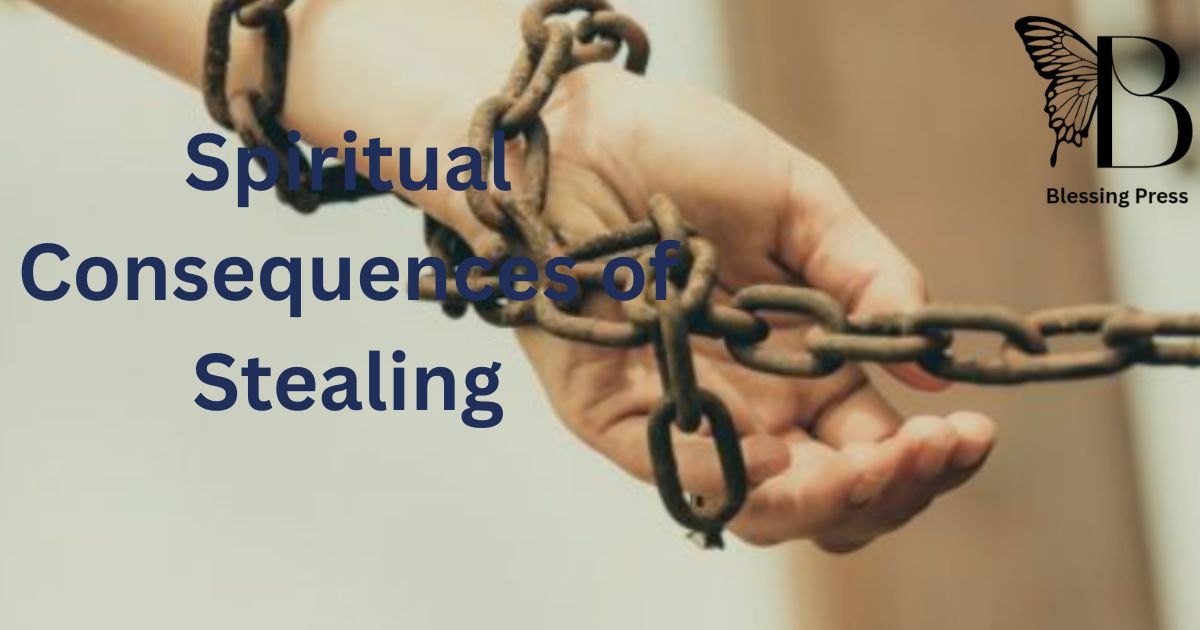Have you ever wondered why something as “small” as stealing leaves such a heavy weight on the heart? From a child sneaking candy to a business leader caught in fraud, theft is more than just breaking the law; it’s breaking trust, peace, and your connection with God.
The spiritual consequences of stealing go far beyond material loss; they affect your soul, relationships, and even your faith.
In this article, we’ll dive deep into the unseen impact of theft, explore why it happens, and discover how faith and repentance can bring freedom, healing, and a brand-new start.
The Meaning of Stealing in Religious and Moral Context
When people think of stealing, they usually picture obvious crimes like burglary or robbery. But in both biblical and moral teaching, stealing takes many forms:
cheating in business, fraudulent contracts, shoplifting, robbery, fraud, or embezzlement. Even subtler acts like withholding wages, failing to repay debts, or manipulating others for dishonest gain fall under the same moral failure.
From a religious lens, stealing is about more than goods—it’s about trust. It undermines society because it takes advantage of others.
But more importantly, it dishonors God because it refuses to acknowledge His role as provider. In that sense, theft is a sin against God and a violation of the spiritual consequences of stealing law.
Understanding the Commandment Against Stealing
The Eighth Commandment isn’t just a rule carved into stone; it’s a safeguard for justice and dignity. In Exodus 20:15, when God said, “Thou shalt not steal,”
He aimed to protect people not only from material loss but from the erosion of fairness in society. In ancient Israel, theft wasn’t simply about losing livestock or tools—it threatened survival itself.
Fast forward to today’s world, and the commandment still holds. Whether it’s corporate fraud, cheating in business deals, or a teenager caught in shoplifting, every act breaks down trust and creates insecurity.
The apostle Paul, in Ephesians 4:28, reinforced this by urging believers: “Let the thief no longer steal, but rather let him work with his hands, so that he may have something to share with those in need.”
This shows that repentance from stealing isn’t only about stopping theft—it’s about turning selfishness into generosity and giving.
Consider a small-town grocery store in America where repeated thefts force the owner to close down.
The immediate loss is financial, but the deeper cost is communal. Jobs are lost, trust disappears, and a space that once brought people together vanishes.
This illustrates how theft, in any form, erodes society from the inside out.
Why People Steal: Root Causes and Motivations
Why would someone risk reputation, peace, or even jail time for theft? The motivations behind stealing often reveal deeper spiritual consequences of stealing struggles.
Some people steal out of greed and covetousness. They believe what others have will make them happy, but once they take it, emptiness remains.
Others act out of fear—fear of lack, fear of not surviving, or fear of missing opportunities. This lack of faith in God’s provision often drives people toward shortcuts.
In some cases, stealing grows from habit. Consider embezzlement scandals in large companies. At first, the amounts are small, but gradually the behavior becomes systemic.
The person justifies their theft until they can no longer hide it. The 2001 Enron scandal, for example, showed how widespread dishonest gain not only destroyed a corporation but also crushed thousands of employees’ futures.
For some, stealing feels like rebellion against authority or society. They see theft as empowerment, yet spiritually it becomes bondage.
Instead of freedom, it creates chains of guilt, fear, and unbelief. Every act of theft signals a deeper discontent: a refusal to live in contentment and a craving for control outside God’s will.
The Extent and Spiritual Consequences of Stealing in Life and Society

Stealing may look small on the outside, but its damage spreads wide and deep. When you take something that isn’t yours—whether it’s shoplifting, embezzlement, fraud, or even withholding wages—you’re not just breaking civil law.
You’re breaking trust with people and cutting yourself off from God. Scripture makes it clear that theft is more than a simple offense; it’s a sin against God that can destroy your soul if left unrepented.
The United States Department of Justice records millions of theft-related crimes each year. Yet the courts can only measure property loss, not the unseen weight theft carries.
The Bible describes this unseen damage as separation from God and the loss of peace. This is why spiritual consequences of stealing go far beyond courtrooms and fines.
Material Loss vs. Spiritual Damage
At first glance, the cost of theft looks material. You see stolen cars, empty wallets, or unpaid bills. But in reality, the heaviest loss is spiritual. A stolen item might be replaced, but trust and integrity are far harder to rebuild.
Consider this example: A man cheats in his small business, overcharging customers to gain more profit. The money comes quickly, but what follows? He loses sleep, fearing exposure.
His friends stop trusting him. His children see dishonesty as normal. On the surface, he’s richer. Inside, he’s bankrupt. That is the true spiritual consequences of stealing damage of theft—it drains your soul while filling your pockets.
The Bible warns us that dishonest gain never satisfies. In Proverbs 10:2, we read, “Ill-gotten treasures are of no value, but righteousness delivers from death.”
What seems like an advantage today turns into a burden tomorrow. Unlike property, which can be returned, spiritual consequences of stealing emptiness lingers until repentance and transformation occur.
Social and Emotional Impact of Theft
Theft doesn’t just hurt the thief—it ripples outward into families, communities, and nations. When a teenager is caught in shoplifting, parents feel shame.
When corporate executives commit fraud, thousands lose jobs and retirement funds. When wages are withheld, families struggle to pay rent or put food on the table.
The emotional damage is equally severe. Victims of theft often feel violated, unsafe, and bitter. Communities grow suspicious, and relationships crumble.
On the other hand, thieves themselves suffer. They carry guilt, paranoia, and fear of exposure. Over time, their ability to feel true joy or trust others weakens.
In spiritual consequences of stealing terms, theft is poison to the heart. Jesus said in Matthew 15:19 that theft flows from the heart, alongside evil thoughts, false witness, and blasphemy.
That means stealing isn’t just about behavior—it reveals who we are inside. And unless the heart is transformed, the cycle repeats itself endlessly.
What Stealing Says About Your Soul
Every act of theft communicates something about your soul. It says you believe God’s provision isn’t enough.
It shows you value possessions more than integrity. It signals that fear or greed has more power over your life than faith.
The apostle Paul, addressing the early church, made it clear that cheating in business, lying, or taking from others was incompatible with the Christian life.
Instead, he called believers to live with integrity, honesty, and accountability, not because it’s socially convenient but because it reflects God’s nature.
The spiritual consequences of stealing include:
- Loss of peace: The heart grows restless and anxious.
- Separation from God: Sin blocks the intimacy you once felt with Him.
- Broken trust: People distance themselves, leaving you isolated.
- Guilt and shame: Instead of joy, your spirit carries heavy burdens.
Stealing may look like a way to get ahead, but in truth, it drags your soul behind.
Spiritual Perspectives on Stealing and Its Consequences

When it comes to spirituality, theft takes on new dimensions. It isn’t limited to money, possessions, or wages.
There’s also such a thing as spiritual consequences of stealing theft, where people misuse, distort, or take credit for spiritual traditions not their own. This idea stretches across cultures, religions, and philosophies.
Inheriting a Spirituality
Some people inherit a faith tradition from family or community. At first glance, it might not feel like theft. But when someone clings to inherited beliefs without living them sincerely, they risk practicing a “borrowed faith.”
Spiritually, it’s like wearing a mask rather than walking in truth. The ethical responsibility in spirituality calls us to make inherited beliefs our own through commitment, not laziness.
Buying a Spirituality
In modern America, spirituality has become commercialized. People buy crystals, books, or courses promising peace and power.
But faith cannot be bought. Jesus warned against turning worship into a marketplace (John 2:16). When spirituality becomes a commodity, it mirrors theft—it takes sacred truths and cheapens them for dishonest gain.
Creating a Spirituality
Some attempt to “create” their own spiritual consequences of stealing path by picking ideas they like and discarding others they dislike. While this may feel freeing, it often strips truth of its depth.
This cross-pollination of faith practices can enrich understanding when done with humility, but when done carelessly, it becomes a kind of spiritual consequences of stealing theft, taking fragments without respecting their roots.
Borrowing a Spirituality
Borrowing practices from other cultures—such as yoga, meditation, or chants—can bring wisdom if approached with respect.
But if it’s done casually or commercially, it risks cultural appropriation. Just like stealing money devalues hard work, spiritual consequences of stealing borrowing without respect devalues sacred traditions.
Stealing a Spirituality
This occurs when people claim spiritual insights or traditions as their own while ignoring or erasing the communities they came from.
For example, using Native American rituals for entertainment, or marketing Eastern practices without credit, is more than disrespectful—it is spiritual consequences of stealing theft.
The spiritual consequences of stealing in this sense are serious. It robs communities of dignity, erodes authenticity, and leaves the “thief” empty because truth cannot be stolen—it must be lived.
Is There Ever a Defense of Theft?
Some argue there are cases where theft might be excusable—for survival, for example. Stealing bread to feed a starving child sounds noble. Yet spiritually, even desperate theft reflects a crisis of faith.
The Bible teaches us to trust God’s provision rather than sin against Him. Still, Scripture also emphasizes compassion: communities are called to care for the poor so that desperation never leads to theft (Leviticus 19:9–10).
The balance lies here: theft is never right, but society bears responsibility to prevent conditions where people feel forced to steal. Spiritually, the answer to poverty is generosity, not theft.
Faith and Transformation: Overcoming the Spiritual Consequences of Stealing
The good news is that theft does not have to define your story. The Bible gives hope that even the worst sins can be forgiven and transformed.
Through faith, the thief can become a giver, and the guilty can walk in freedom. When you understand the spiritual consequences of stealing, you also begin to see why God offers a better way forward.
A New Kind of Person Through Faith
Stealing reveals a heart enslaved to fear, greed, or pride. But faith in Christ creates a newness of life, transforming a thief into “a new creation” (2 Corinthians 5:17).
This transformation isn’t just about quitting theft—it’s about becoming a completely different kind of person.
Think about Zacchaeus, the tax collector in Luke 19. He had built his life on dishonest gain, overcharging people and growing wealthy through fraud.
Yet when he met Jesus, his heart changed. He promised to repay everyone four times over and give half his wealth to the poor. That’s the power of faith—it doesn’t just stop sin, it births generosity.
Faith shows us that working honestly with your hands is more fulfilling than stealing. As Paul wrote in Ephesians 4:28, the goal is not just survival but having enough to share. That shift—from taking to giving—is the sign of a truly changed heart.
Faith That Defeats the Desire to Steal
Why does faith matter so much? Because stealing is rooted in unbelief. People steal when they doubt God’s care or believe possessions will give them joy. Faith in God’s promises directly counters this.
- Faith brings contentment, teaching you that God’s provision is enough.
- Faith creates trust, freeing you from the fear of lack.
- Faith births compassion, making you care more for others than for possessions.
When faith fills your heart, the desire to steal fades. You no longer crave dishonest gain because you believe God will meet your needs in His time.
How God Brings Victory Over Sin
Victory over theft isn’t just about self-control. It’s about God’s power. Romans 6:14 reminds believers, “Sin shall not have dominion over you.”
This means theft loses its grip when you surrender to Christ.
God brings victory in three ways:
- Forgiveness through Christ removes the guilt and shame of past thefts.
- Transformation of the heart replaces greed with generosity.
- Strength through the Holy Spirit empowers you to resist temptation and live with integrity.
When a thief turns to God, chains break. The spiritual consequences of stealing emptiness is replaced with peace, and the heart learns to rest in faith rather than chase after stolen things.
Remedies and Repentance for the Sin of Stealing
Healing from theft requires more than regret—it requires true repentance. The Bible calls for action that restores relationships, repairs damage, and rebuilds trust.
The remedies may not be easy, but they open the door to freedom.
Steps Toward True Repentance
Repentance starts with confession. Admit the theft to God, acknowledging it as a sin against God and a violation of His law. But repentance goes further: it includes turning away from sin and embracing new life.
The steps include:
- Confession and restitution: Owning up to the theft before God and, if possible, before those harmed.
- Seeking forgiveness through Christ: Believing His sacrifice covers even the darkest sins.
- Commitment to change: Choosing honesty and accountability in every area of life.
Repentance is not about words alone—it’s a complete shift in direction.
Making Amends and Restitution
The Bible repeatedly ties repentance with making things right. In Exodus 22, a thief was required to restore more than what was stolen. Zacchaeus mirrored this principle when he returned fourfold to those he cheated.
In today’s world, making amends might mean repaying money, returning stolen items, or offering compensation when direct repayment isn’t possible. It could also mean rebuilding trust slowly with consistent honesty.
Restitution isn’t always comfortable, but it’s powerful. It heals relationships, demonstrates sincerity, and proves that faith has truly transformed your life.
Developing Honesty and Integrity

Repentance leads to growth. Once forgiveness is received and restitution made, the journey continues through developing honesty and integrity.
This involves small daily choices: being truthful in business, paying debts on time, respecting others’ property, and living with ethical responsibility in spirituality.
The opposite of theft isn’t just “not stealing.” It’s living a life of generosity. A reformed thief doesn’t merely stop taking—he starts giving.
He shifts from draining others to uplifting them. And in doing so, he becomes a reflection of God’s grace.
FAQs;
What are the spiritual consequences of stealing?
Stealing separates you from God, creates guilt, and brings emptiness to your soul. True peace comes only through repentance and faith.
How can I overcome the spiritual consequences of stealing?
Begin with confession and repentance before God, make restitution where possible, and trust Christ for forgiveness and a new start.
Does God forgive someone who has stolen many times?
Yes, God’s mercy is greater than repeated sins. Through confession, repentance, and genuine change, forgiveness is always possible.
Why do people feel guilty after stealing?
Because the soul knows theft is both a sin against God and a wound to others. That inner guilt is a call to turn back.
What steps show true repentance after stealing?
True repentance means confessing the sin, making amends, and living with honesty. Restitution and integrity prove a changed heart.
Conclusion;
Stealing may seem like a quick gain, but it always leaves behind lasting wounds. The spiritual consequences of stealing go far deeper than money or possessions: they touch the soul, break trust, and distance you from God. Yet no one is beyond redemption.
Through confession, repentance, and making amends, even the darkest past can be rewritten. Faith in God’s provision turns takers into givers, and broken lives into healed ones. True freedom begins when you choose honesty, integrity, and a heart transformed by grace.

hy, My name is Malik Asif. am a blogger form last 10 year. am a exper

